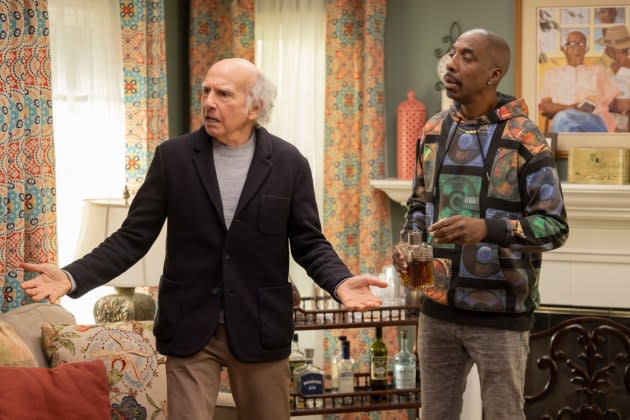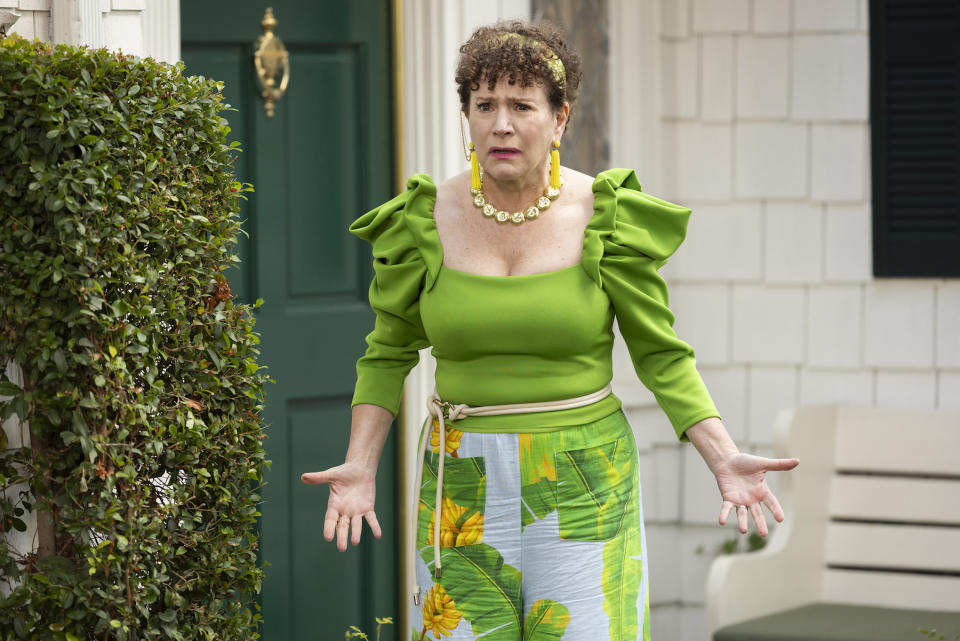‘Curb Your Enthusiasm’ Final Season Is a Very Mixed Bag
- Oops!Something went wrong.Please try again later.
- Oops!Something went wrong.Please try again later.
- Oops!Something went wrong.Please try again later.

It’s a running gag in the 12th season of Curb Your Enthusiasm that people keep mentioning that Larry David didn’t work on the last two seasons of Seinfeld, but then returned for the finale. Every time, Larry greets the observation with stony silence, because he knows the audience hated that finale, and assumes he is being given another thinly-veiled complaint about it.
David already gave himself a mulligan on that back in 2009, when Curb Season Seven revolved around the fictionalized Larry producing a Seinfeld reunion episode; the glimpses we saw of it were much funnier than anything in the real finale. And throughout the run of Curb, he’s gotten better at writing endings. The previous 11 seasons already featured two episodes that were blatantly presented as series finales: Larry dying, then being kicked out of the afterlife for being annoying, in Season Five; and Larry and Leon (J.B. Smoove) having to flee America for Paris to escape a feud with Michael J. Fox, in Season Eight. Plenty of other season-enders (the Seinfeld special, Larry triumphing in The Producers) would have filled that function well if David had decided not to return, since his deal with HBO has long allowed him to make seasons only when he wants to.
More from Rolling Stone
How to Watch the Final Season of 'Curb Your Enthusiasm' Online Free
'True Detective: Night Country' Episode Three: The Monster Awakens
This 12th season is officially being called the final one, at least right now. David’s in his mid-70s, and he’s never needed the money. So maybe he really is done, and this finale will be the last one he ever makes. If so, he’s raised the degree of difficulty on himself, because latter-era Curb hasn’t been as consistently sharp, surprising, or funny as it was in the years leading up to that Paris trip. There are usually a few vintage episodes per season, but the batting average is way down. Of this year’s first nine installments, the opener is by far the best, while the others range from uneven to largely ineffective. If David has a masterpiece up his sleeve for the last one, it would be a very pleasant surprise.
We pick up with Larry still dating the deeply unpleasant Irma Kostroski (Tracey Ullman), and still interacting with the untalented, cheerfully tactless actress Maria Sofia Estrada (Keyla Monterroso Mejia), as ongoing fallout from last season’s swimming pool fence mess. There’s a lot of Ullman, who gets to sing the JG Wentworth jingle repeatedly, and unfortunately not much of Mejia. But the arc of the season involves Larry getting into a whole new kind of legal trouble, which I’m embargoed from mentioning here. All I can say is that it’s a clever and very Curb idea in theory, but one that unfortunately feels better suited to the show’s first decade, when the storytelling was a lot tighter than it’s been since a six-year hiatus ended in 2017.
Like Seinfeld, the early days of Curb were brilliant not just because of the funny things characters did and said in any given scene, but because of the Swiss watch nature of the plotting, where every action by Larry caused an unexpected ripple effect, and where the convergence of every storyline by the end of the episode felt as hilarious as any of the dialogue David or Susie Essman or Jeff Garlin improvised. The show feels much less meticulous in that way these days. Ideas are set up but not always paid off, and conclusions can sometimes come out of nowhere.
The legal subplot at least offers the potential of consequences to a series that has had difficulty establishing comic stakes for a while. When Curb began, Larry was rich from Seinfeld, but he was also married to Cheryl (Cheryl Hines), and a lot of his behavior was guided by the need to appease a wife who barely tolerated him a lot of the time (with good reason), to help out an actual friend like Jeff, or to do the same for someone to whom Larry owed a professional debt. But he and Cheryl have been divorced for a long time (Hines still appears from time to time, including this season, with Ted Danson again in tow), and stories increasingly place Larry in situations where a man of his staggering wealth, and even more staggering misanthropy, would just smirk and walk away. In one episode this season, Stu, a guy Larry vaguely knows from the country club(*), has a stroke, and Larry is startled to learn that Stu considers him a close friend, whom he wants to keep an eye on his daughter in the event of Stu’s death. And Larry for some reason keeps indulging Stu and his wife on this! If it was an isolated storyline, you shrug and move on, since even the 2000s seasons had their duds. More often than not, though, Larry’s behavior no longer rings true, and happens just to set up various plots. The legal trouble, for instance, comes about because Jeff has arranged for Larry to get a personal appearance fee, which he doesn’t need, to attend a rich man’s birthday party, where he’s required to be cordial with a house full of strangers, which he hates. The season at least has some fun with Larry acknowledging the depths of his selfishness — when Jeff needs to find Susie a birthday gift, Larry says, “What a thing to go through: you have to think about another person. It’s just terrible” — but his actions too often fly unconvincingly in the face of those words.
(*) There is a lot of time spent on the golf course this year. Those stories have rarely worked in the past — and when they did, it was largely a credit to the genius of the late Bob Einstein as the perpetually aggrieved Marty Funkhouser — and they are an absolute slog now.
From time to time in the past, David would repurpose an idea from Seinfeld; in the New York season, Larry became friends with 1986 World Series goat Bill Buckner, as a spiritual sequel to Jerry hanging out with 1986 World Series winner Keith Hernandez. But it was infrequent, and usually with a smart enough twist to be worth the bother. It’s happening more now, and less effectively. Where once George Costanza upset a friend by stretching out the man’s turtleneck sweater due to his large head, here Leon’s aunt accidentally does the same to a pair of Larry’s glasses. Like George, Larry gets into an argument with expectant parents over a name that evokes Yankees legend Mickey Mantle. And like George, Larry tries to figure out a way to date a beautiful, surprisingly interested movie star (Marisa Tomei then, Sienna Miller now) while trapped in a relationship with a woman he can’t stand. David and company are even recycling old Curb storylines. The second season finale involved a masseuse and Larry getting their signals crossed about whether Larry wants a sexual favor at the end of the massage. There’s a similar miscommunication in the new season, though the end result is different.

When you’ve been making any show for this long, repetition is bound to happen. (The first happy ending joke was so long ago that, when Larry went to Jeff’s office to tell him about it, Jeff was talking with Mike Binder about Binder’s short-lived HBO comedy The Mind of the Married Man.) But when you add that to a lot of jokes that are meant to be topical(*) but now feel ancient — like a subplot where characters keep ruining Wordle for others, or an actor satirizing their participation in a real world scandal from five years ago — it’s hard to shake the idea that Curb has overstayed its welcome. There’s a particularly dire queer panic subplot where a mortified Larry finds out that an ex-lover is a trans man. Every character in the scene is casually tossing around the trans character’s deadname — including the trans man himself, as well as a close friend of his, played by a Very Special Guest Star whose identity is embargoed — in a way that people who know anything about trans culture just wouldn’t today. (It’s one thing for Larry to be oblivious to this; it’s everybody else that’s the issue here.) Said guest is a good sport elsewhere in that episode, but that sequence feels like it was written in 1987.
(*) The show also can’t resist underlining all the references, just in case the audience doesn’t recognize them. It’s not enough, for instance, to do a sight gag inspired by Rudy Giuliani’s infamous hair dye sweat moment; Larry has to outright mention Giuliani by name.
When Curb feels like Curb these days, it tends to be in individual moments where one of the actors (J.B. Smoove most frequently) goes off on an amusing riff — the premiere is strong because it has such a high concentration of that — or when David and company identify a social construct that still feels somewhat novel. At one point, Larry realizes that Richard Lewis is using AA meetings as a place to try out new comedy material, and later needs Lewis’ help to get “Conan clearance” so he can feel comfortable approaching guarded new neighbor Conan O’Brien. I laughed at least a couple of times at almost every new episode, but those laughs often came after long, uncomfortable stretches where none of the material in between landed.
That Larry spends much of the season facing legal consequences for his actions is itself a callback to the infamous Seinfeld finale, where Jerry, George, Elaine, and Kramer are all sentenced to a year in prison for violating a small town’s Good Samaritan law. If we’re headed toward David once again ending a series with his main character in trouble with the law, maybe it’s because he has finally figured out how to make the idea work, and has kept making Curb just long enough to get redemption for that. Or maybe, like Larry opening up a spite store at the end of Season Ten, David is moving in the same general direction as a way to thumb his nose at all the viewers who’ve been whining about the end of Seinfeld for the last 26 years.
Hopefully, it’s at least memorable, in a way that Curb only occasionally has been in these later years.
The final season of Curb Your Enthusiasm premieres February 4 on HBO and Max, with episodes releasing weekly. I’ve seen the first nine episodes.
Best of Rolling Stone

